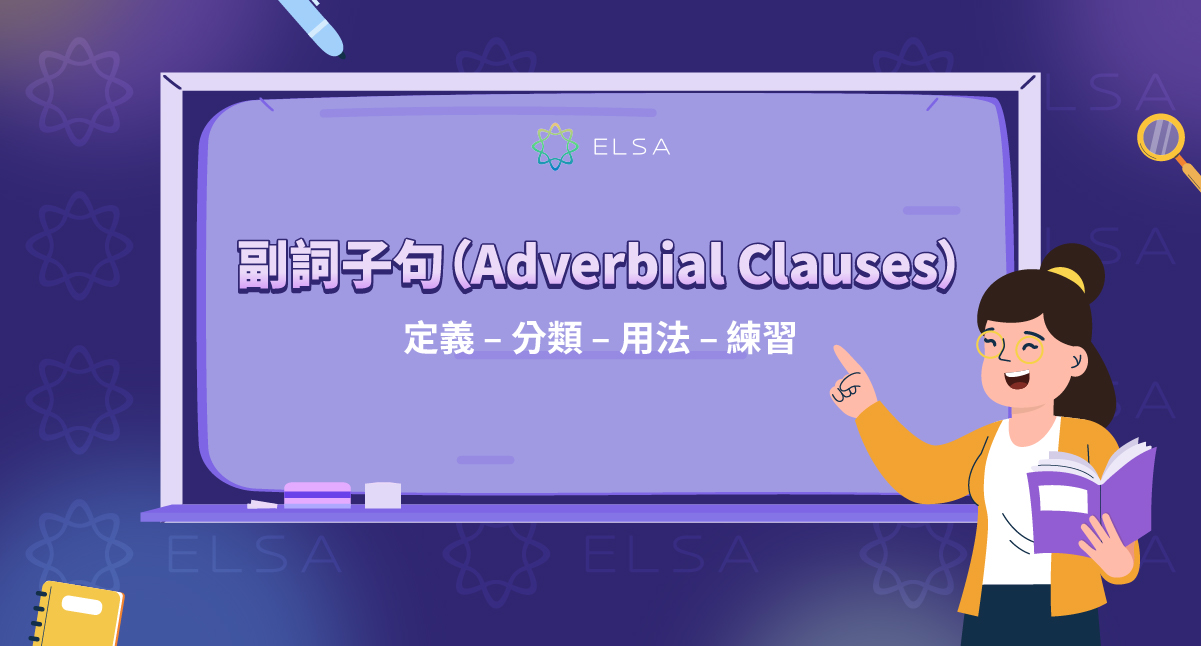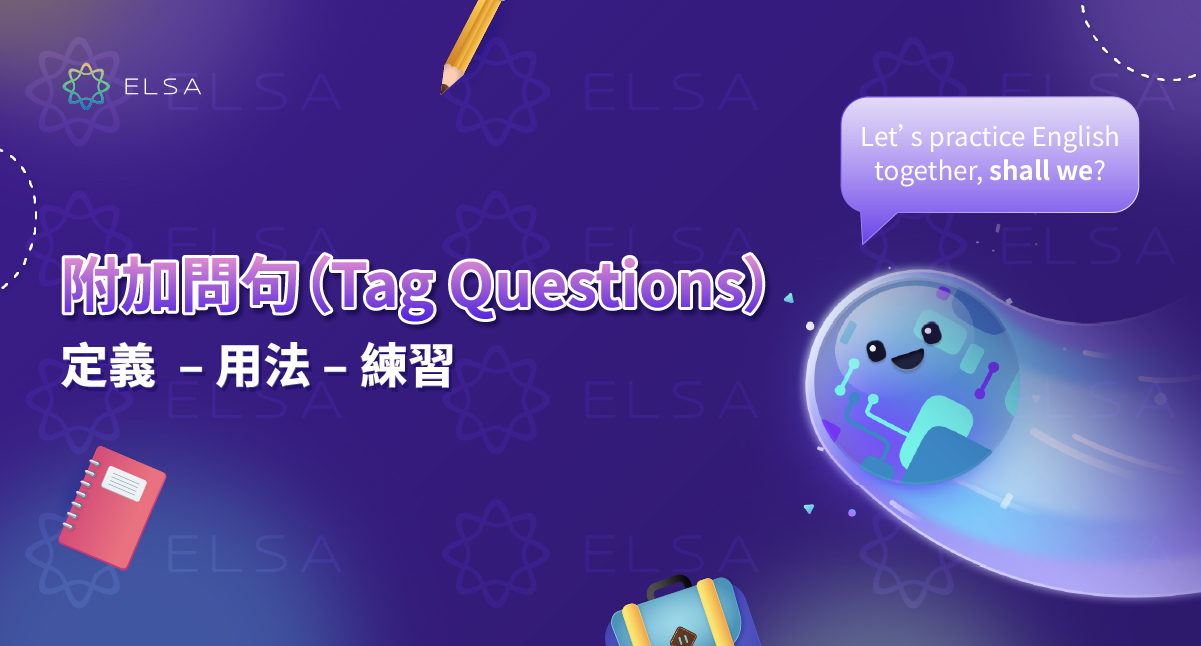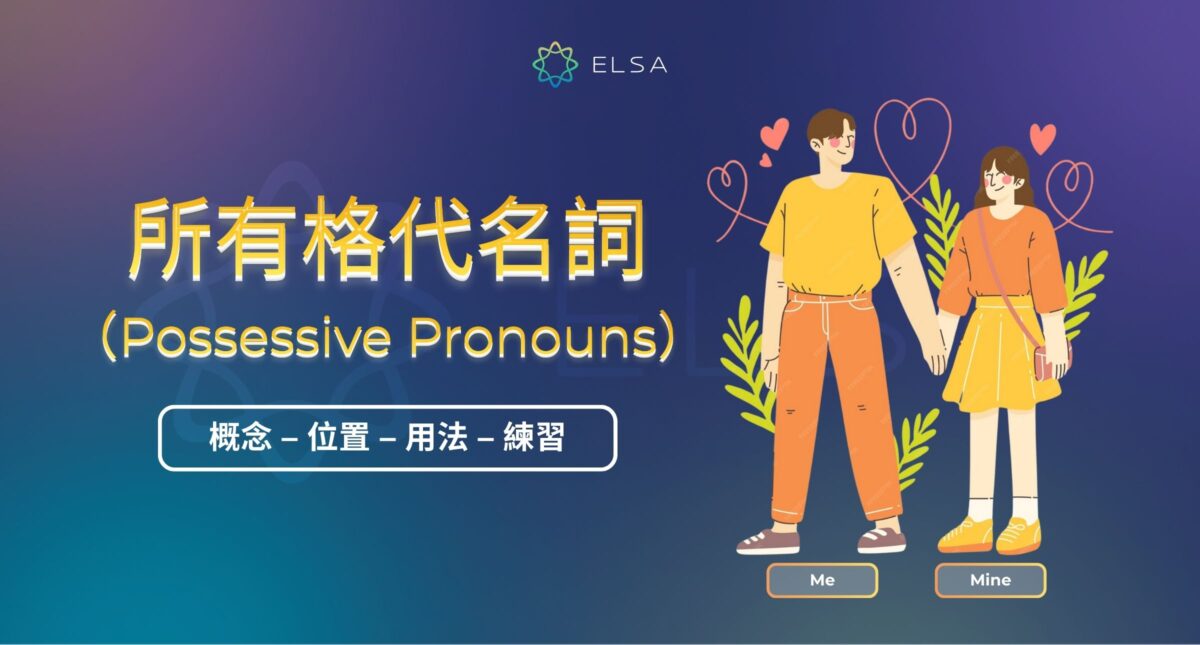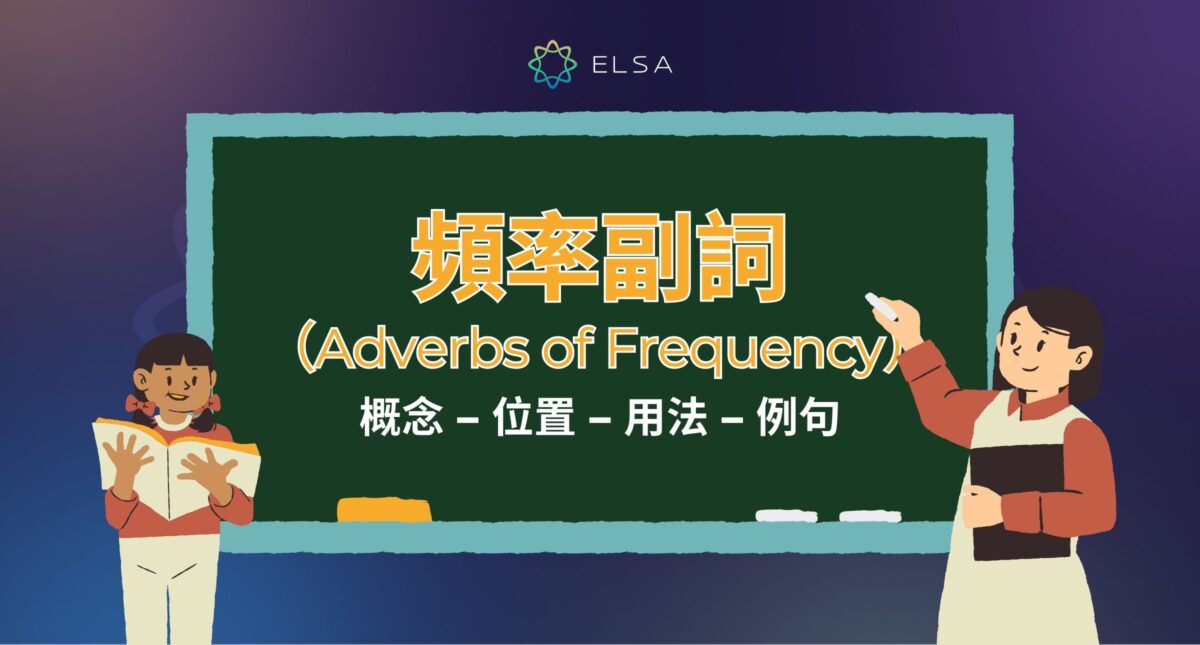在英語語法中,副詞子句(Adverbial Clause)是一個非常重要的部分,使句子更加清晰、流暢。它通常用來回答「when(何時)、where(在哪裡)、why(為什麼)、how(如何)」等問題,並由從屬連接詞引導。因此,讓我們與 ELSA Speak 一起學習副詞子句英文, 副詞子句用法與副詞子句練習。
| Key takeaways |
| 副詞子句是由從屬連接詞開頭的從屬子句,具有副詞的功能,用來修飾動詞、形容詞、副詞或整個主要子句(如時間、原因、條件、目的、讓步等)。它不能獨立存在,必須與主句搭配使用。 位置 – 句首: Because it rained, we stayed home. – 句尾: We stayed home because it rained. 常見連接詞 – 時間: when, while, before, after, since, until… – 原因: because, since, as – 條件: if, unless, as long as – 目的: so that, in order that – 讓步: although, though, even if 注意 – 不同於形容詞子句(修飾名詞),副詞子句用來修飾動詞、形容詞、副詞或整個主句。 – 可以省略部分內容,但意思會變得不夠明確。 |
副詞子句是什麼?

副詞子句 英文(Adverb Clause)是一種不能單獨存在的從屬子句,具有副詞的功能,用來修飾動詞、形容詞、副詞或整個主句,使句子更加具體、生動並富有語境。副詞子句可以放在句首、句中或句尾,並且可表達字面或比喻意義。
副詞子句例句:
- He participates in club activities after he’s done with classes every Wednesday.
(每週三放學後,他都參加社團活動。)
- As dollar signs flashed in her eyes, my cousin agreed to the proposal.
(想到眼前的好處,我的表弟便同意了那個提議。)

副詞子句 位置

副詞子句(Adverb Clause)可根據其修飾的成分放置於句子的不同位置。掌握好位置有助於靈活運用,使句子更加自然流暢。
副詞子句 修飾動詞
當副詞子句用來修飾動詞時,可以放在句首或句尾。
例句:
- He was robbed by some strangers in a dark alley before he got home.
= Before he got home, he was robbed by some strangers in a dark alley.
(他在回家前,被搶劫於一條黑暗的小巷中。) - As I’m sick, I won’t be able to come to your birthday party.
= I won’t be able to come to your birthday party as I’m sick.
(因為我生病了,所以無法參加朋友的生日聚會。) - Although the result is bad, she is not upset.
= She is not upset although the result is bad.
(儘管結果不好,她並不難過。)
副詞子句 修飾形容詞或副詞
在這種情況下,副詞子句通常緊接在其所修飾的形容詞或副詞之後。
例句:
- The weather is so hot that I can’t go out.
((天氣太熱了,所以我無法外出。) - I loved her as if she was my own child.
(我疼愛那女孩,如同自己的親生女兒。) - The deal turned out better than I expected.
(這份協議結果比我預期的還要好。)
>>閲讀更多:頻率副詞 (Adverbs of Frequency): 位置, 用法與詳細例句
副詞子句省略法
在省略後,副詞子句仍保留其原本的位置。
例句:
- Be careful when you walk on the street!
= Be careful when walking on the street!
(走在路上時要小心。) - As he is a teacher, he is responsible for educating children.
= Being a teacher, he is responsible for educating children.
(因為是老師,他有教育孩童的責任。)
副詞子句分類

根據副詞子句連接詞,我們可以將副詞子句分為八種類型:
- 時間副詞子句(Adverbial Clause of Time)
- 地點副詞子句(Adverbial Clause of Place)
- 方式副詞子句(Adverbial Clause of Manner)
- 目的副詞子句(Adverbial Clause of Purpose)
- 原因副詞子句(Adverbial Clause of Reason)
- 結果副詞子句(Adverbial Clause of Result)
- 條件副詞子句(Adverbial Clause of Condition)
- 讓步副詞子句(Adverbial Clause of Concession)
讓我們一起與 ELSA Speak 來了解這些副詞子句的種類,以及它們在各種情境下的副詞子句 用法吧!
時間副詞子句 (Adverbial clause of time)

時間副詞子句用來表示某個動作發生或進行的時間點。這類子句通常由時間連接詞引導,例如: when, while, before, after, since, until, as soon as, whenever等。
| 連接詞 | 意義 | 例句 |
|---|---|---|
| When | 當……時 | I will call you when I arrive at the airport. (我到機場時會打電話給你。) |
| While | 在……期間 | He watched TV while eating dinner. (他一邊吃晚餐一邊看電視。) |
| Before | 在……之前 | Please finish your homework before going out. (出門前先完成作業。) |
| After | 在……之後 | She went to the gym after working. (她下班後去健身房運動。) |
| Since | 自從……以來 | I have known her since we were in high school. (我從高中起就認識她了。) |
| Until | 直到……為止 | Stay in the classroom until the bell rings. (待在教室裡直到鐘響為止。) |
| As soon as | 一……就…… | I’ll tell you as soon as I receive the email. (我一收到電子郵件就會通知你。) |
| Whenever | 每當……時 | She cries whenever she is sad. (她每當難過時就會哭。) |
地點副詞子句 (Adverbial Clauses of Place)

地點副詞子句用來描述主句中動作發生的地點。這類子句通常由以下連接詞引導,例如: where, wherever, anywhere, everywhere…等。
| 連接詞 | 意義 | 例句 |
|---|---|---|
| Where | 在……的地方 | The party will be held where we had our wedding. (宴會將在我們舉行婚禮的地方舉辦。) |
| Wherever | 無論在哪裡 | You can sit wherever you like in the theater. (在劇院裡,你可以坐在任何你喜歡的地方。) |
| Anywhere | 任何地方 | You can find good coffee anywhere in this city. (在這座城市的任何地方都能找到好喝的咖啡。) |
| Everywhere | 到處 | People were running everywhere to find shelter from the storm. (人們到處奔跑尋找避風的地方。) |

方式副詞子句 (Adverbial Clauses of Manner)

方式副詞子句用來說明主句中的動作是以何種方式或方法進行的。這類子句通常由以下連接詞引導,例如: as, just as, like, as if, as though, the way…
| 連接詞 | 意義 | 例句 |
|---|---|---|
| As | 照……的方式 | He did the homework as his teacher told him. (他照老師說的方式完成作業。) |
| Just as | 完全像 | She sings just as her mother used to sing. (她唱歌的樣子就像她母親以前一樣。) |
| Like | 像……一樣 | They dance like professionals on the stage. (他們在舞台上跳舞,像專業舞者一樣。) |
| The way | 依照……的方式 | Do it the way I showed you. (請依照我教你的方法去做。) |
| As if | 彷彿 | She smiled at him as if she knew him well. (她對他微笑,彷彿非常熟悉他一樣。) |
| As though | 好像 | The student answered confidently as though he knew the answer for sure. (那位學生自信地回答,好像他確定知道答案。) |
目的副詞子句 (Adverbial Clauses of Purpose)

目的副詞子句用來說明主句中動作的目的或意圖。這類子句通常由以下連接詞或片語引導: in order to, so as to, to, so that, in order that.
| 連接詞/片語 | 結構 | 例句 |
|---|---|---|
| In order to | S + V + in order/so as (not) + to + V …(以 / 為了…) | She saved money in order to buy a new car. (她存錢是為了能夠買一輛新車。) |
| So as to | He left early so as to catch the first bus. (他早早離開,好趕上第一班公車。) | |
| To | I study hard to improve my English. (我努力學習以提升英文水平。) | |
| So that | S + V + so that / in order that + S + can/could/will/would + V(以 / 為了…) | He studied hard so that he could pass the exam. (他勤奮學習,為了能通過考試。) |
| In order that | She writes notes in order that she won’t forget important points. (她做筆記是為了不忘記重要的要點。) |
原因副詞子句 (Adverbial Clauses of Reason)

原因副詞子句用來說明主句中動作的理由或原因。常見的連接詞有: because, as, since, due to, owing to, because of…
| 連接詞 | 結構 | 例句 |
|---|---|---|
| Because | Because / As / Since + S + V(因…) | She couldn’t attend the meeting because she was sick. (她因生病而無法參加會議。) |
| As | As it was raining, we stayed at home.(因為下雨,我們待在家裡。) | |
| Since | Since we’re running out of time, let’s prioritize the most important tasks. (由於我們時間不多,請優先處理最重要的任務。) | |
| Because of | Because of / Due to / Owing to + N phrase / V-ing(因 / 由…) | The roads were congested because of rush hour traffic. (由於尖峰時段的交通,路上非常擁擠。) |
| Due to | The flight was delayed due to bad weather conditions. (航班因惡劣天氣而延誤。) | |
| Owing to | Owing to his carelessness, he failed the exam. (由於自己的粗心大意,他考試不及格。) |
結果副詞子句 (Adverbial Clauses of Result)

結果副詞子句用來表示主句中的動作或情況所引發的結果,說明因果關係。常見連接詞包括: so, therefore, consequently, as a result, as a consequence, so…that, such…that
| 連接詞 | 意義 | 例句 |
|---|---|---|
| So = With the result that | 因此/所以 | They planned their trip well, so they didn’t encounter any problems along the way. (他們精心策劃了這次旅行,因此一路上沒有遇到任何問題。) |
| Therefore / Consequently / As a result / As a consequence | 因此/所以 | The roads were slippery due to the rain, therefore we had to drive slowly. (因為下雨路滑,所以我們得慢慢開車。) |
| So + adj/adv … that … | 太……以至於…… | The concert was so loud that my ears were ringing for hours afterwards. (音樂會太吵了,以至於我的耳朵在之後幾個小時裡仍聽到嗡嗡聲。) |
| Such + (a/an) + adj + N … that … | 如此……以至於…… | She made such a delicious cake that everyone wanted a second slice. (她做的蛋糕太好吃了,以至於大家都想再吃一塊。) |
>>閲讀更多:因此 英文: So, thus, therefore, hence 的用法
條件副詞子句 (Adverbial Clauses of Condition)

條件副詞子句用來表示主句中的動作或情況發生所需的條件。常見連接詞包括: if, unless, as long as, so long as, whether
| 連接詞 | 意義 | 例句 |
|---|---|---|
| If | 如果 | If it rains tomorrow, we will stay indoors. (如果明天下雨,我們就待在家裡。) |
| Unless = If…not | 除非 | Unless you study hard, you won’t pass the exam. (除非你努力學習,否則你無法通過考試。) |
| As long as / So long as | 只要/在……條件下 | You can borrow my car as long as you return it by tomorrow. (只要你明天之前還車,你就可以借我的車。) |
| Whether | 是否/……(有無條件) | I don’t know whether she will agree to join us. (我不知道她是否願意和我們一起參加。) |
讓步副詞子句 (Adverbial Clauses of Concession)

讓步副詞子句(表示對比或讓步)用來承認一個與主句內容相反或對立的情況。常見連接詞包括: although, even though, though, while, whereas, nevertheless, in spite of, despite, whatever, whoever, however, wherever…
| 連接詞 | 意義 | 例句 |
|---|---|---|
| Although / Even though / Though / In spite of the fact that | 雖然 | Although he is rich, he is unhappy. (雖然他很富有,但仍然不快樂。) |
| While / Whereas / Meanwhile | 然而 | I’m good at singing, while my younger sister is good at dancing. (我擅長唱歌,而我妹妹擅長跳舞。) |
| Nevertheless / Nonetheless | 儘管 | He doesn’t like her, nevertheless he decided to marry her. (他不喜歡她,然而仍決定與她結婚。) |
| In spite of / Despite + N phrase | 雖然 | In spite of the noise, I could still concentrate. (儘管有噪音,我仍然能專心。) |
| Whatever / Whoever / However / Wherever | 無論是什麼 (是誰/如何/在哪裡) | My grandfather is always full of energy, however old he is. (無論我祖父多大年紀,他總是充滿活力。) |
>>閲讀更多:然而英文是什麼?如何使用 however、nevertheless 和具體代替單詞
區分 名詞子句 形容詞子句 副詞子句

| 名詞子句 (Noun Clause) | 形容詞子句 (Adjective/Relative Clause) | 副詞子句 (Adverbial Clause) | |
|---|---|---|---|
| 功能 | 在句中作主語、受詞或補語 | 修飾名詞/名詞片語 | 修飾動詞、形容詞或整個主句 |
| 開頭詞 | that, if, whether, wh-words (what, who, where…) | who, whom, whose, which, that, where, when… | because, although, if, when, after, before, since, so that… |
| 位置 | 可位於句首、句中或句尾 | 置於其所修飾的名詞之後 | 通常在句首或句尾 |
| 例句 | I know that she is right. (我知道她是對的。) | The man who is talking to you is my uncle. (正在和你說話的那位男子是我叔叔。) | I stayed home because it was raining. (因為下雨,我待在家裡。) |
副詞子句練習

練習題
練習 1: 選出正確答案
- We stayed at home ___ it rained heavily.
A. because
B. although
C. unless
D. so that - ___ finishing his homework, he went out with friends.
A. Because
B. After
C. Having
D. Before - She speaks English fluently ___ she has lived in London for 5 years.
A. although
B. since
C. unless
D. until - He works very hard ___ he can support his family.
A. in order that
B. because
C. although
D. unless - ___ being tired, she still helped her little brother with homework.
A. Despite
B. Because
C. Although
D. While - ___ studying abroad, he gained a lot of experience.
A. As
B. Because
C. While
D. By - You won’t pass the exam ___ you study harder.
A. because
B. unless
C. although
D. since - ___ walking in the park, I saw a beautiful bird.
A. Because
B. While
C. Unless
D. Since - ___ having much money, he is not really happy.
A. Because
B. Though
C. In spite of
D. Since - She saved money ___ buy a new laptop.
A. so as to
B. because of
C. although
D. if
練習 2: 在所給的副詞子句中填入合適的連接詞
- He won’t call you ___ he needs help. (unless/although/when)
- She didn’t come to class ___ being sick. (because/though/due to)
- I listened carefully ___ the teacher was explaining the lesson. (when/as/unless)
- ___ busy, he always spends time with his children. (Although/When/While)
- We hurried up ___ we could catch the last bus. (so that/unless/because)
- ___ finishing his breakfast, he went to work. (After/Although/Before)
- The students kept silent ___ the teacher was angry. (since/as soon as/though)
- ___ living in the countryside, she enjoys a peaceful life. (Because/By/Though)
- She looked at me ___ she wanted to say something. (as if/so that/unless)
- ___ being well-prepared, he still felt nervous before the presentation. (Although/Despite/Because)

練習英語
ELSA Pro 終身 – 優惠特價!
原價 6,150元 現價 2,799 元
- ELSA 字典
- 課程内容持續更新
- 220+ 關於工作和生活的主題
- 9600+ 課程
- 學習時間無限制
此外:ELSA PRO 一年套餐以優惠價出售 – 1,866元 (-24%)
答案
練習 1:
| 題號 | 1 | 2 | 3 | 4 | 5 |
| 答案 | A | C | B | A | A |
| 題號 | 6 | 7 | 8 | 9 | 10 |
| T答案 | D | B | B | C | A |
練習 2:
| 題號 | 1 | 2 | 3 | 4 | 5 |
| 答案 | unless | due to | as | Although | so that |
| 題號 | 6 | 7 | 8 | 9 | 10 |
| 答案 | After | since | By | as if | Despite |
常見問題
關係子句 副詞子句之間有什麼關係?
→ 兩者都是由連接詞引導的從屬子句。
不同點:
- 關係子句 → 修飾名詞。
- 副詞子句 → 修飾動詞或整個主句。
副詞子句 時態 如何使用?
→ 在副詞子句中,時態的使用依語境而定,與普通句相同。
注意: 在表示未來時間 (when, before, after, until, as soon as…)的副詞子句中 → 用現在式代替 will。
什麼時候 副詞子句 現在式代替未來式?
→ 在表示時間或條件的副詞子句中 (when, before, after, until, as soon as, if, unless…), 若要表達未來的事情, 不可使用 “will”, 而要用現在式來代替。
例句:
- I will call you when I arrive. (不能說 i when I will arrive)
- If it rains tomorrow, we will stay home.
副詞子句 分詞構句 有關係嗎?
→ 分詞構句實際上是副詞子句的簡化形式,當兩個子句的主語相同時。
副詞子句可用於多種語境:表達時間、原因、目的、條件等。透過練習副詞子句 例句與副詞子句 練習,你將能更加熟練掌握這一語法重點。ELSA Speak 也會持續更新更多有關英語語法的實用文章,幫助你每天提升英語溝通能力!


 2025年/11月/03日 | 魚丸
2025年/11月/03日 | 魚丸









